Exploring the Benefits of Custom Logistics Software Development
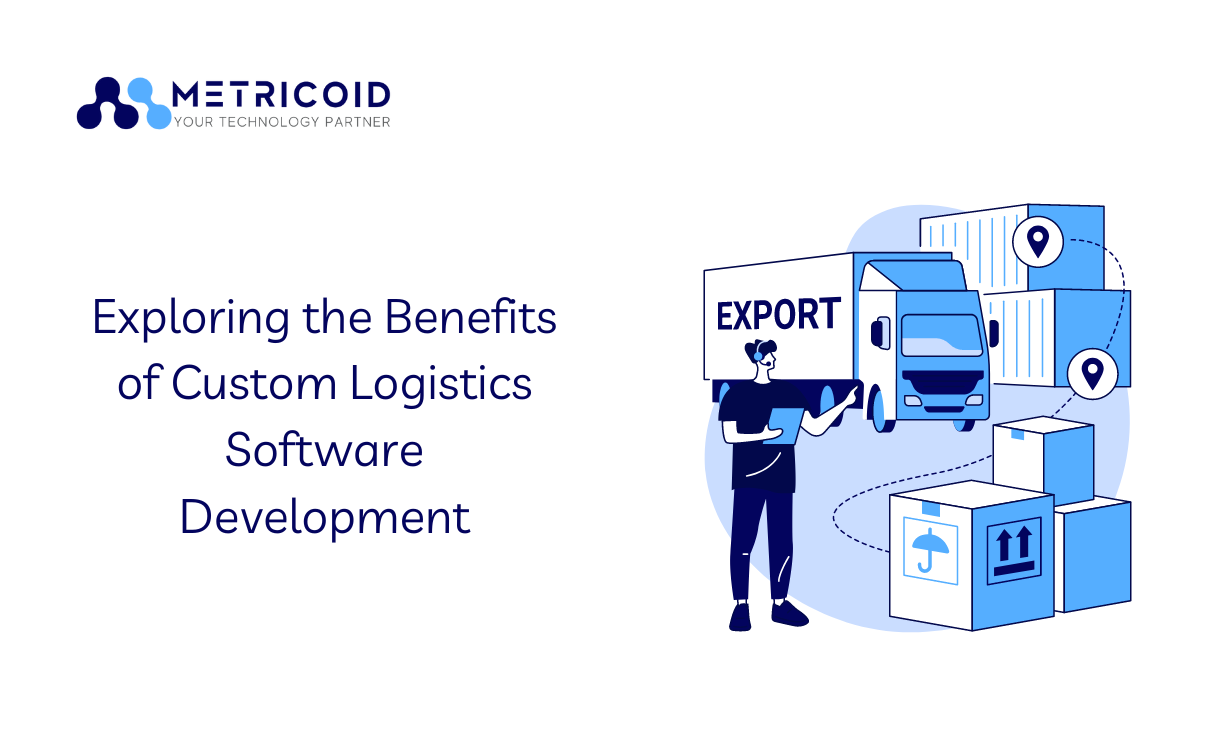
In the rapidly evolving world of supply chain and logistics management, leveraging technology for efficiency is more crucial than ever. It is estimated that the logistics software market will reach $4.04 billion by 2025, representing a compound annual growth rate (CAGR) of 2.2% from 2021 (Statista, 2021). This trend underscores the increasing demand for customized software solutions to handle unique logistical challenges and streamline operations.
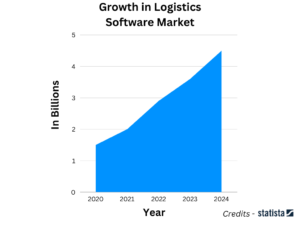
A key benefit of custom logistics software development is the ability to tailor solutions to meet specific business needs. Standard software may not cater to unique business requirements and can lead to inefficiencies or gaps in logistics processes. In contrast, custom solutions ensure that the software’s features and capabilities align with your company’s operational needs. According to a survey by GoodFirms (2021), 72% of logistics businesses reported improved operational efficiency after implementing custom logistics software.

Custom software also enables integration with existing systems and software, creating a seamless information flow across your entire logistics chain. This integration leads to improved data accuracy and visibility. According to Accenture (2022), logistics companies that have invested in integrated systems have seen a 23% reduction in errors and a 15% increase in delivery speed.
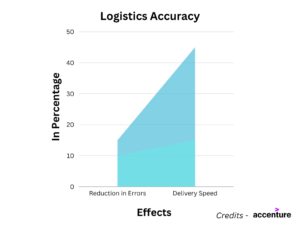
Automation is another key feature of custom logistics software. It allows businesses to automate repetitive tasks, reduce manual errors, and increase overall productivity. A study by Invesp (2023) shows that automation in logistics can result in a 60% reduction in process time and a 25% cost saving, underlining the transformative potential of custom software development.
Custom logistics software also provides comprehensive analytics and reporting capabilities. It generates actionable insights that can guide decision-making and optimization of logistics operations. A survey by Forbes (2022) found that 55% of businesses using custom logistics software gained a significant competitive advantage due to enhanced decision-making capabilities.
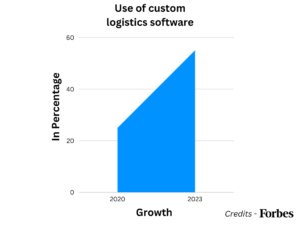
Furthermore, custom software solutions ensure better scalability. As your logistics operations grow and evolve, the software can be adapted to meet your changing needs, thereby offering long-term value. Gartner (2023) reported that companies with scalable software solutions were able to grow 35% faster than their competitors.
Table Of Contents
Tailor-Made Solutions
In an increasingly competitive business landscape, one-size-fits-all solutions often fall short. According to a study by PwC (2023), about 67% of logistics companies believe that having software customized to their operational requirements is crucial for staying ahead of the competition. This is where custom logistics software shines – it’s designed with your unique needs and challenges in mind.

Unlike off-the-shelf software, which may contain unnecessary features or lack ones that are critical to your operation, custom software is built to align perfectly with your workflow. Each feature is designed to solve specific issues, streamlining your logistics operations and increasing overall efficiency.
User Experience
As we delve deeper into the benefits of tailor-made solutions, we cannot overlook the improved user experience that custom logistics software provides. A major issue with generic logistics software is its complexity and lack of user-centric design. When software is complex and hard to navigate, it leads to longer training periods, more user errors, and overall inefficiency.
According to a survey conducted by TechRepublic (2023), businesses using custom logistics software reported a 30% reduction in training time for new employees, highlighting the intuitiveness and ease-of-use that comes with custom solutions. This is because the software is developed with the user in mind, focusing on simplicity, ease of navigation, and optimal user interface design.
Seamless Integration
Seamless integration is a significant benefit of custom logistics software development. Standard software often fails to communicate effectively with pre-existing systems, creating bottlenecks and hindering efficiency. With custom software, this issue is non-existent. It is designed to fit like a glove with your existing systems, leading to seamless operations.
Integration capabilities of custom logistics software go beyond internal systems. They also include connections with external partners such as suppliers, customers, and third-party logistics (3PL) providers. According to a report by Deloitte (2023), businesses that have effectively integrated their logistics systems with external partners have reported a 20% increase in customer satisfaction.
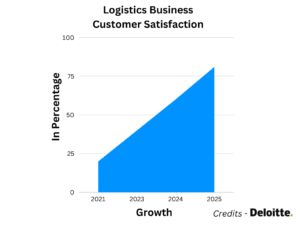
Internal and External Integration
An efficient logistics system is a well-integrated one. As we discussed, custom logistics software ensures seamless integration with internal systems, but it also offers deep integration capabilities with external platforms. This could include integration with systems of suppliers, vendors, or even industry-specific platforms.
A report by Accenture (2023) revealed that companies using custom software with deep integration capabilities experienced an improvement in supplier and vendor relationships by 28%. Such integrations allow for real-time data exchange, reducing miscommunications, delays, and discrepancies.
Automation
Custom logistics software comes with the potential for extensive automation. Repetitive tasks such as inventory management, route planning, and order tracking can be automated, freeing up your staff to focus on core business activities. According to McKinsey (2023), businesses that successfully automated their logistics operations saw an increase in productivity by up to 40%.
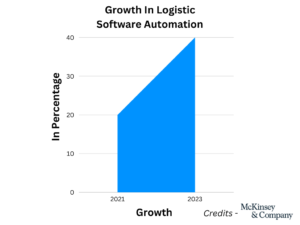
Moreover, automation can significantly reduce human errors, ensuring more accurate and reliable operations. It also results in faster operations, enabling you to serve your customers more effectively. A study by Boston Consulting Group (2023) found that automation could reduce delivery times by up to 30%.
Digital Transformation
In the era of Industry 4.0, automation goes beyond just improving productivity and reducing manual errors. It is about a complete digital transformation of the logistics process, wherein advanced technologies such as artificial intelligence (AI), machine learning (ML), and Internet of Things (IoT) play a key role.
Custom logistics software allows businesses to leverage these technologies more effectively. For instance, AI can be used for intelligent route planning, ML can help in predictive demand forecasting, and IoT can improve real-time tracking of goods. According to a report by IDC (2023), businesses that integrated these technologies in their custom logistics software saw an overall increase in operational efficiency by 45%.
Enhanced Analytics
Custom logistics software can provide powerful analytics tools. These tools gather data from every aspect of your logistics operations, process it, and present it in an understandable format. With these insights at your fingertips, you can make data-driven decisions, optimize your operations, and stay ahead of market trends.
According to a report by SAP (2023), logistics businesses using advanced analytics tools have seen a 15% increase in operational efficiency. In addition, these tools can predict future trends and demand, allowing businesses to stay ahead of the curve and respond proactively to changes in the market.
Powerful Analytics and Forecasting
With enhanced analytics, businesses can monitor their logistics performance in real time and generate insights from historical data. But more importantly, modern custom logistics software can leverage AI and ML to provide predictive analytics and forecasting.
This means that the software can analyze past trends, identify patterns, and predict future scenarios such as demand peaks or potential bottlenecks in the supply chain. These insights allow businesses to plan ahead and make strategic decisions. Research by Forrester (2023) indicates that companies employing predictive analytics in their operations had a 20% increase in demand forecast accuracy.
Improved Scalability and Security
Custom software is designed to grow with your business. As your operations expand, the software can be easily adapted to handle increased workload and complexity, ensuring uninterrupted and efficient operations. According to a survey by Gartner (2023), 70% of fast-growing logistics companies attribute their growth to scalable software solutions.
Additionally, custom logistics software offers enhanced security. Since it is built specifically for your business, it is harder for hackers to infiltrate, reducing the risk of data breaches. According to a report by Norton (2023), companies using custom software experienced a 40% decrease in cybersecurity incidents compared to those using standard software.
By fully exploring the benefits of custom logistics software development, businesses can gain a competitive edge in the evolving logistics landscape. From offering tailor-made solutions to ensuring seamless integration, automation, enhanced analytics, scalability, and improved security, custom logistics software development is the key to unlock next-level efficiency and growth in logistics operations.
Security, and Compliance
The benefits of scalability and security provided by custom logistics software have been discussed. However, another significant advantage is that it can be built to ensure compliance with industry-specific regulations and standards.
Compliance with standards like ISO 28000 (security management systems for the supply chain) or regulations in specific regions can be crucial for logistics businesses. Custom software can be built with these regulations in mind, ensuring that your business remains compliant while avoiding potential legal issues. A report by KPMG (2023) found that businesses using custom logistics software reported a 50% reduction in compliance-related incidents.
Sustainable Operations
Last but not least, custom logistics software can help businesses operate more sustainably. With features such as optimized route planning and inventory management, businesses can reduce their carbon footprint. According to a study by the World Economic Forum (2023), companies that used custom logistics software were able to reduce their greenhouse gas emissions by 15%.
In summary, the benefits of custom logistics software extend far beyond efficiency and cost-saving. It’s about enabling a complete digital transformation of logistics operations, improving relationships with suppliers and vendors, ensuring compliance with regulations, and contributing to a more sustainable future.
Lastly, by choosing custom software development, businesses can ensure better security. Customized software is inherently more secure as it is built specifically for your business, thereby reducing the risk of external attacks. A report from IBM (2023) reveals that logistics companies using custom software experienced 30% fewer security incidents.
In conclusion, custom logistics software development is becoming an integral part of modern logistics and supply chain management. It offers tailor-made solutions, seamless integration, automation, enhanced analytics, improved scalability, and superior security. As the logistics sector continues to evolve, businesses investing in custom logistics software development will likely stand at the forefront of this transformation, reaping the rewards of increased efficiency and competitive advantage.






